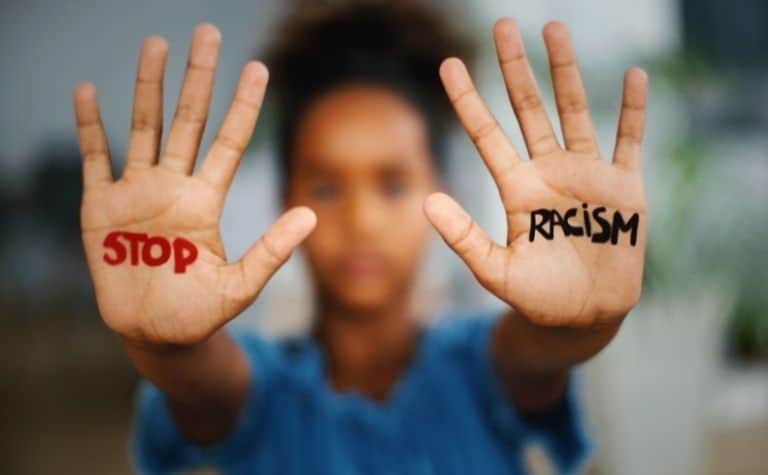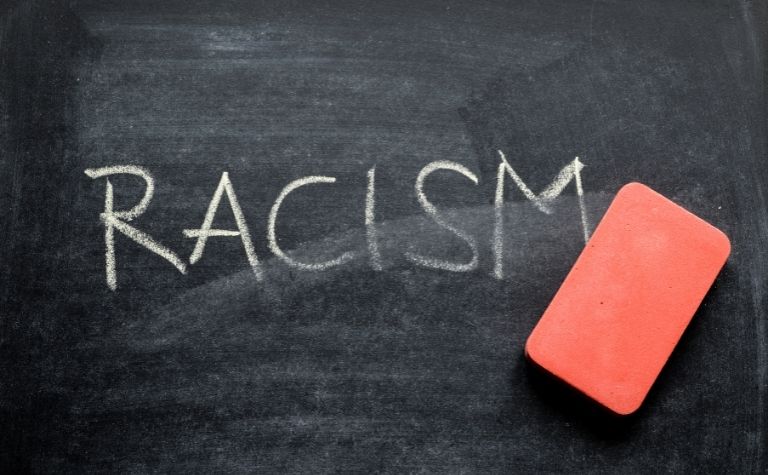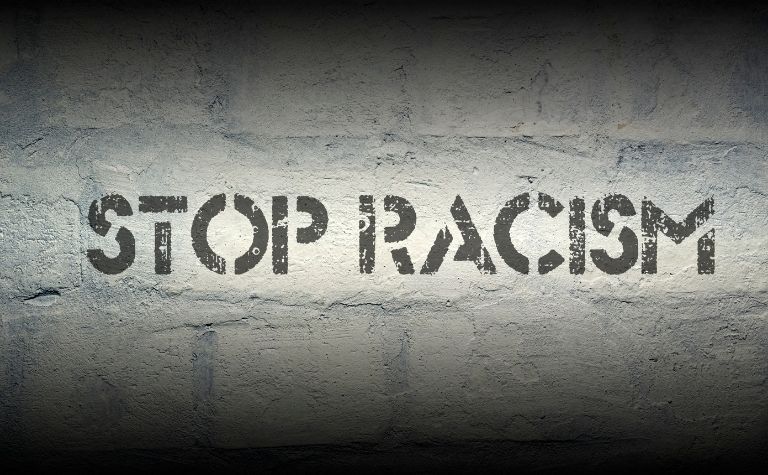God hates racism. Prejudice, discrimination, and antagonism directed against a person or people on the basis of their race or ethnic group is the result of sin and contrary to God’s desire for people to love one another. [1] What does the Bible say about racism?
The Bible is adamantly opposed to racism in all its expressions. God created all people in his image, so every person, whatever their race, has God-given value that others should respect, love, and esteem. Though some people have used the Bible to justify racism, their interpretations are insensible and shameful.
What does Revelation 7:9-10, which is a description of the future, tell people about racism today? What does the Bible say about the equality of people of all races in the world? Keep reading to learn answers to these questions and others.
Also see What Does “Strange Flesh” Mean in the Book of Jude?

Heaven is full of people from every tribe, people, nation, and language
The reason the Bible teaches believers about what the future will be like, including the afterlife, isn’t merely to satisfy their curiosity, but so that they will know what to value, pursue, and prioritize in their life on Earth.
One of the places that the Bible mentions the future is in the book of Revelation. In Revelation 7:9-10, readers get a glimpse of heaven. The verse paints a picture of a large multitude of ethnically diverse people worshipping God. John, the author of Revelation, describes the scene in relation to the ethnic makeup of those who praise God.
“After this I looked, and behold, a great multitude that no one could number, from every nation, from all tribes and peoples and languages, standing before the throne and before the Lamb, clothed in white robes, with palm branches in their hands and crying out with a loud voice, ‘Salvation belongs to our God who sits on the throne, and to the Lamb!'”
Revelation 7:9-10 (ESV)
| Revelation 7:9 Key Words | Greek Word | Biblical Meaning |
|---|---|---|
| multitude | ὄχλος; ochlos | a crowd, the common people |
| nation | ἔθνους; ethnous | a race, people, nation, the nations, Gentiles |
| tribe | φυλῶν; tribes | a tribe or race of people |
| peoples | λαῶν; laōn | characteristically of God’s chosen people |
| tongues | γλωσσῶν; glōssōn | the tongue, a language (distinguished by their speech) |
Is Revelation 7:9 stressing the ethnic diversity of heaven? Yes. Bible scholar Grant Osborne, who many reviewers believe wrote one of the best commentaries on Revelation, says that “every nation” refers to the promise God gave Abraham.
God said Abraham would be the father of many nations, and that all the people of the world would be blessed through him (Gen. 12:1-3, 17:4). “Tribes” refers to the Israelites (cf. 7:4-8). These two descriptions together suggest that “Jewish and Gentile Christians together form the whole people of God.” [2]
Another reputable New Testament scholar, Craig S. Keener, joyfully pictures what the scene may look like:
“Imagine the multi-cultural chorus of saints from all ages — ancient Israel’s Levite pslamists, clapping African saints with joyful praises, European Reformers with their majestic hymns, monks with their Gregorian and Ethiopian Coptic chants, Latin American Pentecostals with shouts of triumph, messianic Jews dancing horah, and a generation of North American street evangelists doing gospel rap!” [3]
How does Revelation 7:9 impact the mission of the church today? The glimpse of heaven that John provides readers tells believers who they should be evangelizing, serving, and loving. In summary, God wants to redeem people from every ethnic group in the world. Osborne writes that “every nation” stresses “the universal mission of the church to the ‘nations.'” [2]
Therefore, racism is an obstacle that hinders the mission of the church. Prejudice, discrimination, and antagonism directed against a person or people on the basis of their race or ethnic group aren’t only off-mission, but they work against God’s eternal plan of redemption.
God’s goal is not simply to have us stop looking down on other races. God wants unity, not just a ceasing of hostilities. He wants the very makeup of His church to preach the gospel: that despite our racial variants we are united under one ancestor, Adam; that we had one problem, sin; and that we have one hope, salvation in Christ.
J.D. Greer. Gaining by Losing, Zondervan, 2015, p. 164.
Also see Are There White People In the Bible? to learn more.

People of all races praise God according to the Bible
God knows, blesses, and saves people of all ethnicities. God loves people of all races, from different nations, who speak different languages. Jesus Christ died for the sins of Caucasians, Africans, Mexicans, Russians, Asians, and all others.
God’s love for all people, whether Jew or Gentile, isn’t an afterthought in the Bible. Rather, it’s one of Scripture’s central messages. Though Revelation 7:9 is a beautiful description of racial unity in heaven, the value of all races isn’t a message that starts in the last book of the Bible or even in the New Testament.
From the first moment that God revealed his plan to redeem humanity from sin, as recorded in the book of Genesis, he communicated that his desire was to reach all people. God told Abram that he would use his descendants to reach all the families of Earth. God’s selection of the Jews involved them serving as missionaries to reach other people groups.
“And I will make of you a great nation, and I will bless you and make your name great, so that you will be a blessing. I will bless those who bless you, and him who dishonors you I will curse, and in you all the families of the earth shall be blessed.”
Genesis 12:2-3 (ESV)
God’s plan is that people from all races would be freed from sin through the work of Jesus Christ (John 3:16). There are several passages in the Old Testament that describe people of all nations praising God.
The nations will benefit from God’s promise of blessing to Abraham (e.g. Ps. 67):
1 May God be gracious to us and bless us
and make his face to shine upon us,
2 that your way may be known on earth,
your saving power among all nations.
3 Let the peoples praise you, O God;
let all the peoples praise you!
4 Let the nations be glad and sing for joy,
for you judge the peoples with equity
and guide the nations upon earth.
5 Let the peoples praise you, O God;
let all the peoples praise you!
6 The earth has yielded its increase;
God, our God, shall bless us.
7 God shall bless us;
let all the ends of the earth fear him!
The nations will come to worship the living God (e.g. Ps. 22:27-28):
27 All the ends of the earth shall remember
and turn to the LORD,
and all the families of the nations
shall worship before you.
28 For kingship belongs to the LORD,
and he rules over the nations.
The nations will be included within Israel as the extended people of God (e.g. Zech. 10-12):
10 Sing for joy and be glad, O daughter of Zion; for behold I am coming and I will dwell in your midst,” declares the LORD. 11 “Many nations will join themselves to the LORD in that day and will become My people. Then I will dwell in your midst, and you will know that the LORD of hosts has sent Me to you. 12“The LORD will possess Judah as His portion in the holy land, and will again choose Jerusalem.
Clap your hands, all peoples!
Psalm 47:1-2 (ESV)
Shout to God with loud songs of joy!
For the LORD, the Most High, is to be feared,
a great king over all the earth.
Also see How To Read the Bible to learn more.

Interracial marriage in the Bible
One of the best illustrations of race in the Bible is the interracial marriages that God blesses. These include,
- Joseph, a Hebrew, and Asenath, an African-Egyptian (cf. Gen. 41:50); two entire tribes of Israelites came from this marriage, Ephraim and Manasseh
- Moses, a Hebrew, and a “Cushite” woman (her name isn’t mentioned) from Africa; God punished Moses’ brother and sister, Aaron and Miriam, for criticizing this marriage (cf. Num. 12:1-9)
- Boaz, a Hebrew, and Ruth, a Moabite (Ruth 1:4, 22; 2:2, 6, 21; 4:5, 10)
Doesn’t God forbid interracial marriage in the book of Ezra? In the book of Ezra, God forbids the Israelites from marrying foreigners (Ezra 10:11). Yet the previous passage makes clear that the issue wasn’t ethnicity per se, but marrying outside the faith (Ezra 9:1-2). Interracial marriage isn’t forbidden in the Old or New Testament, but marrying someone not committed to God is (1 Cor. 7:39; 2 Cor. 6:14-18).
…every nation, from all tribes and people and languages, standing before the throne…
Revelation 7:9 (ESV)
Also see Is Covid 19 in the Bible? to learn more.
References:
[1] Source
[2] Revelation by Grant Osborn. Baker Exegetical Commentary on the New Testament. P. 318-319.
[3] Revelation by Craig S. Keener. NIV Application Commentary. P. 250.
[4] Source
[5] Source
Related Articles
The Bible teaches that people of all races are descendants of Adam and Eve (Gen. 3:20). Common ancestry and the fact that all people bear the image of God (Gen. 1:26-27), unite the human race, even...
The Bible is a long book containing 66 individual books. Some common-use Bibles can weigh between 4 and 5 pounds. Some decorative church and family Bibles can weigh much more. It's not uncommon for...
